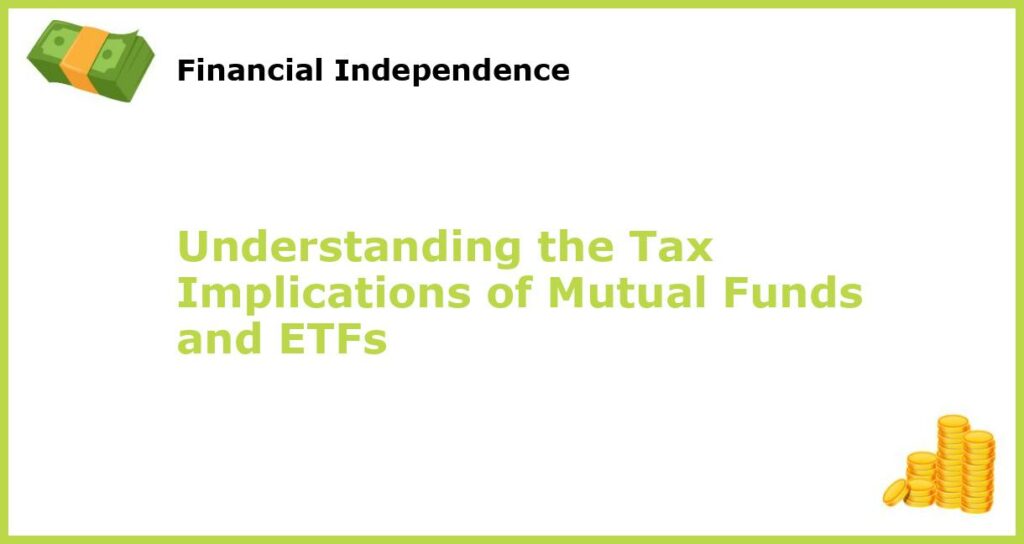Investing is a great way to build wealth, but it’s important to understand the consequences before making choices. This is particularly true with mutual funds and exchange-traded funds (ETFs), which can be an effective way to invest tax-efficiently. There are many aspects of taxes associated with mutual funds and ETFs that investors should consider, including differences in the way these investments are taxed, the impact of dividends and capital gains on taxes, the importance of tracking cost basis, and tax loss harvesting. This article will explore these topics and provide insight into how to make the most educated and effective investment decisions.
Tax-Efficient Investing with Mutual Funds and ETFs

Investing in mutual funds and exchange-traded funds (ETFs) can be tax-efficient because these funds minimize taxes on investment gains. This can save investors significant amounts of money in the long run. Because minimizing taxes is such a big part of investing, understanding the tax implications of mutual funds and ETFs is essential. This understanding will help investors make informed choices that will benefit them in the long term.
The Difference in Tax Treatment between Mutual Funds and ETFs

There are differences among mutual funds and ETFs regarding taxation. Generally, mutual funds are required to distribute capital gains to shareholders at the end of each year, whereas ETFs distribute gains only when shareholders sell shares. This difference can impact an investor’s tax liability, leading to complex financial considerations. Investors should therefore evaluate the costs and benefits of mutual funds and ETFs on a per-investment basis.
The Impact of Dividends on Taxes

The tax rates of mutual funds and ETFs depend on the dividends an investor earns. Generally, these dividends are taxed as ordinary income, although the tax rate depends on whether the dividend is considered qualified or non-qualified. Qualified dividends are taxed at a lower rate than non-qualified dividends. It is, therefore, essential to understand which type of dividend an investor is receiving to get optimal tax efficiency.
The Role of Capital Gains in Taxation

The role of capital gains must be understood when considering mutual funds and ETFs. Gains on investments occur when securities are sold at higher prices to their original purchase rate. These investments result in different types of taxation, which can depend on the length of time that an investor held them. Stockholding for more than a year can result in more favorable tax circumstances than holding it for less than a year.
The Importance of Tracking Cost Basis
Knowing the cost basis of mutual funds and ETFs is an essential part of understanding taxes. Cost basis refers to the purchase price of a financial investment, and it enables investors to determine capital gains or losses if they decide to sell the investment. This is a complex matter when investing in mutual funds or ETFs with a high portfolio turnover rate. Investors should be conscious of the associated costs and potential implications of varying tax rates.
Using Tax-Advantaged Accounts to Invest
Tax-advantaged accounts, such as individual retirement accounts (IRAs) and 401(k)s, provide special tax benefits for investors. These accounts allow investors to lower tax bills and save for retirement. Mutual fund and ETF investing optimally utilizes these benefits. Maximizing investments in such accounts can be useful in minimizing taxes on investment returns.
Understanding Tax Loss Harvesting
One investment strategy to minimize taxes is tax loss harvesting. This strategy involves selling investments at a loss to offset gains in other investments. This can help reduce an investor’s tax bill and mitigate the impact of mutual funds and ETFs that distribute large capital gains. It’s important to be aware of the wash-sale rule, however, which prevents investors from buying a substantially identical investment for a period of 30 days after selling the losing investment.
Consulting with a Tax Professional
Investors should consider working with a professional tax advisor to fully understand the tax implications of mutual funds and ETFs investing. A tax professional can provide valuable insights and help identify tax-efficient investment strategies, which can ensure that investors make informed decisions.
Considering Tax Implications when Choosing Investments
Taxes should be an integral part of an investor’s decision-making process when selecting mutual funds and ETFs. This consideration is important when factoring in other benefits, risks, and fees associated with investing. Minimizing taxes can have a significant impact on long-term investment outcomes, so it is crucial to evaluate one’s options appropriately.
Tax Optimization as a Long-Term Strategy
Investors who prioritize tax efficiency with their mutual fund and ETF investments can reap the benefits over the long run. While minimizing taxes should not be the only consideration when making investment decisions, tax optimization should be part of a comprehensive, long-term strategy for building wealth. The ability to maximize investment returns while minimizing taxes is critical to long-term financial success.







